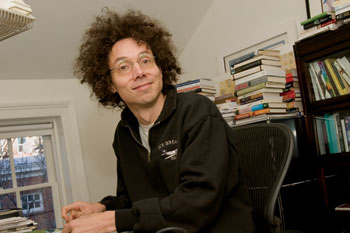Standing Ovation For Maureen Tkacik’s “Gladwell for Dummies”

What, me huckster?
Tkacik’s indictment of Gladwell is incisive, epic, merciless, and right. It runs a full seven web pages and is worth reading every word. Now, the next time you see someone reading Blink and reflexively go to slap it out of their hand, you’ll be able to explain why you did it. Here’s a choice gleaning from fairly late in the piece. Click through to start at the beginning.
Also, it’s worth looking at this piece in light of this website’s ongoing discussion of what good criticism can or should look like. The piece is occasioned by the publication of Gladwell’s new book, Outliers, but it could hardly be considered a mere “review” of that book. And yet, it’s not a NY/LRB-style essay, where the book(s) provide a sort of anchor for a larger discussion about something else. Tkacik seems completely at ease in Gladwell’s catalogue, moving with an apparent lack of effort through and between his books. She has a clear thesis that is developed, amplified, and otherwise nuanced over the course of the essay. A writer who disagrees vehemently with Tkacik’s thesis and all her supporting arguments–or a writer who couldn’t care less about Gladwell one way or the other–still has a lot to gain from reading this essay. It’s a stand-out example of a particular kind of long-form criticism.
November 7th, 2009 / 3:45 pm
